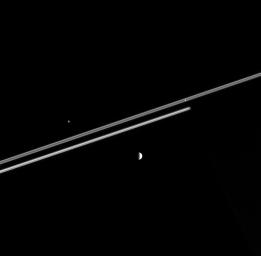
|
Where’s Saturn?
- Click the image above for a larger view
- Full-Res JPEG (658 x 646) (11.0 kB)
- Full-Res TIFF (658 x 646) (425.7 kB)
Caption:
The Cassini spacecraft captures three moons at once as they hurtle around Saturn. In the background, Saturn's night side covers the more distant portion of the rings, betraying the presence of the unseen giant.
At left and right respectively, the two smaller moons are Epimetheus (116 kilometers, or 72 miles across) and Pandora (84 kilometers, or 52 miles across). Larger Mimas (397 kilometers, or 247 miles across) lies below.
The image was taken in visible light with the Cassini spacecraft narrow-angle camera on Feb. 16, 2006, at a distance of approximately 3.3 million kilometers (2.1 million miles) from Saturn. The image scale is about 20 kilometers (12 miles) per pixel.
Background Info:
The Cassini-Huygens mission is a cooperative project of NASA, the European Space Agency and the Italian Space Agency. The Jet Propulsion Laboratory, a division of the California Institute of Technology in Pasadena, manages the mission for NASA's Science Mission Directorate, Washington, D.C. The Cassini orbiter and its two onboard cameras were designed, developed and assembled at JPL. The imaging operations center is based at the Space Science Institute in Boulder, Colo.
For more information about the Cassini-Huygens mission visit http://saturn.jpl.nasa.gov/home/index.cfm . The Cassini imaging team homepage is at http://ciclops.org .
Cataloging Keywords:
| Name | Value | Additional Values |
|---|---|---|
| Target | Saturn Rings | Epimetheus, Mimas, Pandora, Saturn |
| System | Saturn | |
| Target Type | Ring | Planet, Satellite |
| Mission | Cassini-Huygens | |
| Instrument Host | Cassini Orbiter | |
| Host Type | Orbiter | |
| Instrument | Imaging Science Subsystem (ISS) | |
| Detector | Narrow Angle Camera | |
| Extra Keywords | Grayscale, Visual | |
| Acquisition Date | ||
| Release Date | 2006-03-22 | |
| Date in Caption | 2006-02-16 | |
| Image Credit | NASA/JPL/Space Science Institute | |
| Source | photojournal.jpl.nasa.gov/catalog/PIA08139 | |
| Identifier | PIA08139 | |
